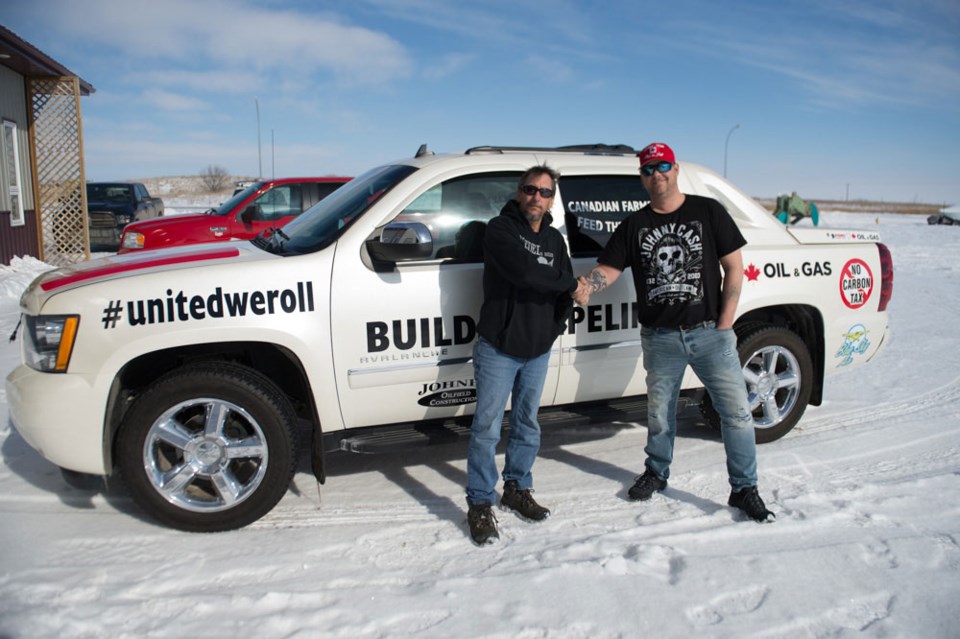The United We Roll Convoy to Ottawa is over now, but there are still many stories to tell, and approximately 55 people came out to hear them on Mar. 2 at a town hall meeting in Estevan.
Jay Riedel and Pat King met through their efforts in organizing the convoy, with Riedel in Estevan and King in Red Deer. Riedel has been one of the key organizers of the yellow vest protests in Estevan since mid-December, and he led a Saskatchewan contingent of 10 trucks that left Carnduff to join the main convoy on Feb. 15.
Both of them spoke on Parliament Hill.
Riedel said, “We had no idea what to expect throughout the country.”
They saw some anti-pipeline counter-protesters on the far side of Winnipeg. But once they got into Ontario, they were blown away.
“Wow, it opened our eyes,” Riedel said. “Little kids were waving flags.”
Towns the size of Bienfait and Carnduff showed strong support along the way. The convoy was broadcasting its location through an online app, allowing people to know when they would arrive. They often couldn’t make their planned timings, because they ended up spending so much time at communities along the way who had opened their hearts to the convoy.
Even in a -30 C wind chill, people stood on the side of the street for an hour, waiting for the convoy.
The industrial fire truck driven by Glen Carritt, the convoy’s lead organizer, had a sticker on the hood for people to sign. In the end, the whole truck was covered with signatures, and they estimate it was around 20,000 in all.
“That sticker didn’t last one town,” Riedel said.
At Pembroke they estimated 2,000 people came out to see the convoy. A first nation lit off fireworks for 15 minutes in their honour.
“We were starting to realize we’re not divided as Canadians, we’re united as Canadians,” Riedel said.
“It’s not Canadians that are divided, but the mainstream media and the government that are dividing us.”
At Parliament Hill, where the convoy rallied for two days on Feb. 19-20, Riedel said, “I’m sure Trudeau was peeking through the blinds.”
No one from the Liberal or NDP parties showed up, he noted.
As for criticisms that the convoy was in some way racist, Riedel showed a video of a black man from Weyburn who emigrated from Kenya over two decades ago, who took part and supported the group.
King spoke of how he left Sault Ste. Marie, Ont., after high school because of the difficulties that community, largely dependent on the iron ore and steel industry, had suffered over the years, with massive layoffs as a regular occurrence.
“When they shut down our mines, our industry shut down,” he said, warning that the same could happen in Estevan as the federal government moves to “phase out coal,” a statement Prime Minister Justin Trudeau reiterated on March 4 in Toronto.
He said, “I watched my town fall through the floor. I’ve watched people suffer, and starve. Our steel plant comes on and off, on and off, with two-year layoffs, caused by the government handing over our resources to foreign markets.”
“Canada is a carbon sink. If they shut down your plants, Estevan will be a ghost town. You have an industry that is your livelihood. You’re about to lose it. Bill C-69, C-48, what I’m seeing here is exactly what happened in Ontario 20 years ago.
He spoke against low voter turnouts and urged people to vote.
As much as he would like to, King said, “We cannot do experimental politics. We have to choose the lesser of two evils, the party that will get the people heard.
“They don’t want us to succeed. People with power scare governments. People with a voice scare governments.”
On Parliament Hill, King had his eyes opened. Police denied him access to the Centennial Flame, where he wished to pay his respects. He found that CBC’s interview of him, as broadcast, was substantially different than what was recorded live. “CBC took every word and flipped it around.”
He said the media has been bought for $600 million. “You lose your freedom of speech,” King said.
King said Saudi Arabia ramped up its oil production to match Alberta’s curtailment. On top of that, “They don’t pay carbon tax,” King said.
Regarding freedom of speech, King felt that there was some form of interference with their online broadcasts. “They were shutting us down. My feeds, our webpages were being shut down,” he noted.
As for the counter-protests, King said that while politicians were stealing the stage, he hugged a young gentleman who had been pounding the drum in the counter-protest. “I found out he was from my native band,” King said.
There were some questions and answers, but King ended on a somber note. “I have a friend in Sault Ste. Marie that I have to go and clean out her foreclosed house tomorrow.”
That house was in Estevan.



